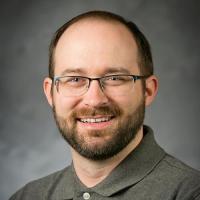Discovering a Secret Ingredient to Effective Teaching: Showmanship
Mark Schreiner
Tyler Bletsch is the Duke ECE recipient of the new annual Pratt School of Engineering Faculty Performance Award

Is it too much of a stereotype for an engineering professor to geek out on the aerodynamic performance of candy? Not to Tyler Bletsch, professor of the practice of electrical and computer engineering at Duke.
“As a teacher, if you just emit information, if you just transmit facts, nothing’s going to land, you’re not going to get anywhere with students,” he said. “The job is at least 25 percent showmanship.”
 In his courses, which take on new challenges in robotics, computer system architecture and cybersecurity, Bletsch strives to create moments that confound, delight and inspire. It’s serious fun, with a purpose. Bletsch wants students to join him on a journey into a realm that is full of uncertainty and open-ended questions.
In his courses, which take on new challenges in robotics, computer system architecture and cybersecurity, Bletsch strives to create moments that confound, delight and inspire. It’s serious fun, with a purpose. Bletsch wants students to join him on a journey into a realm that is full of uncertainty and open-ended questions.
“I want students to reach a point where workbook exercises don’t help, and they’re outside the comfort zone,” he said. “A place beyond theory.”
Bletsch is the recipient of the Pratt School of Engineering’s Teaching Performance Award in the Department of Electrical & Computer Engineering. The new annual awards were created to recognize, encourage and reward exceptional distinction, innovation and productivity in teaching. Four are awarded each year, with winners receiving a $15,000 salary bonus.
From the first, Bletsch wanted to be an engineering educator, but he got pulled in a different direction.
“Teaching, that is the reason I started my PhD,” he said. “As an undergrad, I had a tremendous experience as a teaching assistant, even running a lab. I wanted to teach at a university level.”
But, he found an internship and an industry career working on the origins of cloud computing. According to Bletsch, that cloud had a silver lining. “I see now that that industry job made me a better teacher,” he said.
Working in industry showed Bletsch steps not included in most flowcharts of the engineering design process—dealing with the unexpected, fixing poor team communications, and working productively with marketers and other non-engineers.
At Duke, as a professor of the practice, Bletsch is focused on teaching and the student educational experience. In the courses he has designed, he focused on exposing students to the realities of practicing engineering.
During a senior programming design course, he sees the profound effect real-world, project-based learning has on students. His course requires students to develop four ever-better versions, or “evolutions,” of programming projects.
“In the first evolution, they all make the same rookie mistakes—not testing their code enough and not communicating effectively across the team,” he said. “By the fourth evolution, they’re not making the rookie mistakes. They see in an uncanny simulation of real life what making these mistakes means to their team. Now they test, test, test. They’ve learned something about the challenges of real-world practice.”
Among the best experiences as a teacher, he said, is what he calls the “… and then what” moment. It’s when a student gets the core concepts but then begins to see how they fit together with working as an engineer.
“It’s like seeing the curvature of the Earth for the first time,” Bletsch said. “It’s a moment of connection, and it invites possibilities.”
Such his invitation to ECE 560: Computer and Information Security. In that cybersecurity course, he engages students by requiring them to solve cryptanalytic puzzles to access each class assignment.
In one, Bletsch simply emails students a picture of a tree on campus. Students have to remember what they’ve learned about digital images to discover where on Duke’s deeply forested campus the tree is rooted. There, he’s safely attached a scannable code that unlocks the next class assignment.
Bletsch is a big believer in learning outside of the classroom and has founded engaging projects with an infectious brand of can-we-build-it enthusiasm. He serves at the engaging advisor of Combat Robotics at Duke, where team members — they can have little experience or a lot, or be undergraduates or studying for their master’s or PhD — build laptop-sized battlebots.
As for the aerodynamics of candy, Bletsch brings boxes of what he terms “throwing candy.” Just as smart meeting facilitators do in the corporate world, during course sessions, Bletsch keeps students engaged with occasional sprays of candy into the audience.
According to his recent research, one brand of individually wrapped chewy fruit candy from Japan has just the right flight characteristics for his needs.
“I bought a suitcase-full,” Bletsch said.
